Exploring Prayer Practices in Dubai: Culture and Faith
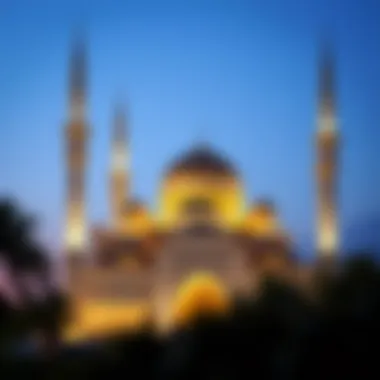
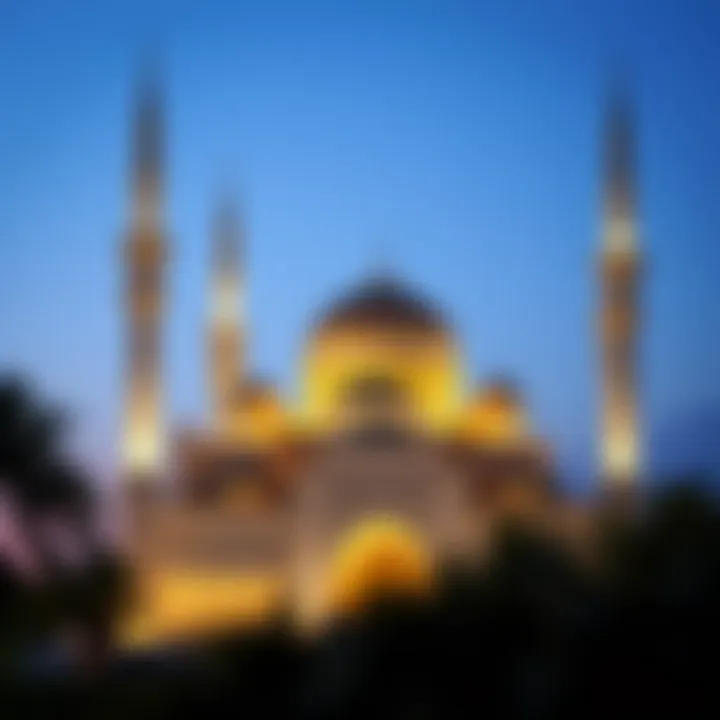
Intro
Prayer holds a pivotal place in the lives of many residents and visitors to Dubai. In a city where modern skyscrapers touch the sky, the call to prayer echoes from minarets, grounding the cosmopolitan essence of Dubai in its rich Islamic traditions. There’s an intricate interplay of daily routines and spiritual disciplines that unfolds in this melting pot of cultures.
By looking closely at the significance of prayer practices in Dubai, we can reveal much more than just rituals; we uncover how these practices shape community bonds, personal identities, and even business relationships. As we explore the diverse places of worship, the unique customs associated with prayer, and the broader implications for daily life, we aim to enrich both understanding and appreciation of the spiritual landscape in this vibrant city.
To truly grasp the essential role of prayer in Dubai, readiness to traverse into the heart of its traditions is paramount. From the bustling markets to serene prayer rooms, each setting offers a glimpse into how prayer intertwines with the everyday experiences of those who call this city home. Moving forward, let's peel back the layers of meaning and delves into the vibrant tapestry of spiritual life that characterizes Dubai.
The Importance of Prayer in Dubai
Prayer holds a cornerstone position in the social and spiritual landscape of Dubai. It transcends mere religious practice, weaving itself into the very fabric of daily life for locals as well as expatriates. By understanding the significance of prayer in this dynamic city, one gains insight into the collective identity and cultural cohesion that unites diverse communities in harmony.
Historical Context
Dubai's history is rich and multifaceted, dotted with influences from various civilizations. The initial settlers drank from the same spring of spiritual needs, and as Islam grew, so did the importance of prayer in unifying the people. Historical records can show that the practice of prayer in the region dates back to the inception of Islam in the 7th century, solidifying its role in the daily lives of those who inhabit this land.
The Arab Peninsula, known for its tribal society, often used rituals as a means of gathering and solidifying bonds among members. This scenario was a precursor to the structured prayer practices we see today in Dubai’s mosques. The architectural evolution of mosques over the centuries—with innovations reflecting culture and faith—also bears testimony to the commitment to maintain the sanctity of prayer among the people.
Walking through the heart of the city, you can witness striking architectural structures closely tied to these histories, enhancing the narrative surrounding their importance as places where community gathering occurs.
Religious Significance
At its core, prayer is not merely a set of rituals; it serves as the lifeblood of Islamic belief systems. In Islam, the act of praying five times a day is not just a duty—it's a direct line to the Divine that reinforces faith, instills discipline, and fosters a sense of community. These prayers, known as Salah, function both as spiritual nourishment and as a method to punctuate the day with moments of introspection and gratitude.
In a cosmopolitan city like Dubai, where cultures intermingle, the practice of prayer provides a familiar rhythm to life that aids expatriates and travelers in bridging gaps between differing customs. It creates shared experiences that unite individuals despite their varied backgrounds.
Prayer in Dubai also serves as an emblem of resilience, reflecting the dedication of its populace to uphold their beliefs amid the challenges posed by a rapidly modernizing world. Utilizing both historical and contemporary perspectives, understanding this facet of Dubai’s culture can shed light on how prayer practices enhance communal ties.
“Where there is prayer, there is a promise of growth—not just spiritually, but socially.”
In summary, the importance of prayer in Dubai can’t be overstated. It forms a tapestry that binds various influences together, creating a unique narrative that respects tradition while also embracing modernity. This intricate balance of spiritual practices represents a commitment to faith, community, and the shared journey of the inhabitants of this vibrant metropolis.
Islamic Practices and Beliefs
Islamic practices and beliefs lie at the heart of everyday life in Dubai. Understanding these elements provides deeper insights into how residents and visitors experience the vibrant cultural landscape of this city. At the core of Islam are the practices and beliefs that shape the spiritual foundation of millions around the world, particularly in a place like Dubai where tradition meets modernity.
The Five Pillars of Islam
The Five Pillars of Islam form the basic framework of a Muslim's life, influencing both individual behavior and the broader community. These pillars serve as a guide for followers, providing a structured approach to spirituality and social responsibility. The pillars include:
- Shahada: The declaration of faith, stating that there is no god but Allah, and Muhammad is His messenger. This fundamental belief establishes the core of a Muslim's identity.
- Salah: Performing the five daily prayers, which are a way of connecting with Allah and reinforcing faith. These prayers occur at specific times throughout the day and are a reminder of one's devotion.
- Zakat: The practice of giving to charity, which emphasizes the social responsibility of Muslims to help those in need.
- Sawm: Fasting during the month of Ramadan, fostering spiritual reflection and self-discipline.
- Hajj: The pilgrimage to Mecca, which is an essential act of worship for those who are physically and financially able to undertake it.
These pillars are not just rituals to be performed; they are acts of faith that resonate through the rhythms of daily life in Dubai. For expatriates and locals alike, adhering to these practices creates a sense of community and shared identity, no matter how diverse the population.
Role of Prayer in Daily Life
Prayer plays an instrumental role in the daily lives of Muslims in Dubai. Those moments of pause, punctuated by the call to prayer—known as Adhan—serve several functions in society.
Firstly, prayer acts as a reminder of one's spirituality amidst the distractions of modern life. For many, it is a moment to step away from work-related stresses or personal troubles, offering a chance to reconnect with their faith. This practice is often seen within workplaces and homes, as people carve out time to fulfill their spiritual obligations.
Moreover, prayer can foster a sense of community. Whether in a mosque or in the privacy of their home, the act of praying can encourage social cohesion. During weekly congregational prayers like Jumu'ah on Fridays, the mosque becomes a hub for social interaction.
Furthermore, alongside ensuring personal spiritual well-being, these practices reflect the cultural fabric of the city. In Dubai, where people from various backgrounds converge, the observance of prayer showcases an essential intersection of faith and culture, reinforcing the importance of understanding and respecting diverse beliefs.


The rhythm of prayer is more than a set of actions; it’s a living reminder of the divine intertwined with the everyday hustle of life in Dubai.
In a city that embraces rapid development, the importance of Islamic practices stands resilient, illustrating how spirituality integrates seamlessly with the hustle and bustle of urban life. This intricate balancing act continues to influence how Dubai evolves, making it a unique place to observe the persistence of tradition in a modern context.
The Call to Prayer in Dubai
The call to prayer, known as the Adhan, stands as one of the most recognizable elements of Islamic culture in Dubai. This ritual invocation is not just a call for worship; it symbolizes the deep spiritual connection that ties the community together, resonating beyond physical boundaries. Understanding its nature and significance in Dubai offers a glimpse into both the city's cultural identity and the everyday life of its residents.
Adhan: The Ritual Call
The Adhan is recited five times a day, marking the specific times for prayer in Islam. It is not merely a signal; it is an auditory representation of faith and belonging. The melodic nature of the call, often delivered by a muezzin from the minaret of mosques, evokes reverence and mindfulness among listeners, compelling them to pause and reflect.
When one hears the soft, yet powerful sound of the Adhan, it's as if the city itself draws to a halt. It invites even those who may not practice, to participate in a shared moment of contemplation. Residents often share stories of how the call serves as a metronome of the day, segmenting the hours and offering a rhythm to life. The rich history of the Adhan can be traced back to the time of Prophet Muhammad, evolving in its delivery and significance over centuries.
"The melody of the Adhan is not just about words; it’s a reminder of community, patience, and faith."
Timing of Prayers
Prayers in Islam, known as Salah, occur at specific times which are determined by the position of the sun. In Dubai, like any other Muslim-majority region, these timings can shift based on the season and geographical location.
- Fajr: The dawn prayer, performed before sunrise.
- Dhuhr: The noon prayer, after the sun passes its zenith.
- Asr: The afternoon prayer, which varies according to the length of shadows.
- Maghrib: The evening prayer, just after sunset.
- Isha: The night prayer, which can be performed after twilight has disappeared.
These five daily prayers structure the day for many residents, interspersing periods of work, leisure, and family time with moments dedicated to spirituality and reflection. For expatriates, learning the prayer times can seem challenging at first, yet many find that using mobile apps and online resources can ease their understanding of following the prayers.
Moreover, during special occasions such as Ramadan, timings become even more crucial. The pre-dawn meal, Suhoor, must be completed before the Fajr prayer, and fasting continues until the Maghrib prayer, thereby integrating the rhythm of prayers into daily practices.
Understanding the Adhan and the timings of prayers not only highlights their importance in spirituality but also illustrates the deep connection between cultural practices and the life pace in Dubai. For anyone living or visiting the city, recognizing these moments is key to appreciating the heart of its vibrant community.
Mosques in Dubai
Mosques play a pivotal role in the spiritual and communal life of Dubai. They are not just places for prayers, but rather they symbolize the heart of the Muslim community in the city. The architecture and culture surrounding these mosques provide a window into the history and contemporary practices of Islam in Dubai. Visitors and residents alike benefit from understanding the significance of these structures, which often reflect profound devotion and aesthetic beauty. Additionally, with the burgeoning expatriate population, mosques serve as cultural bridges for understanding Islam amidst a diverse tapestry of beliefs.
Architectural Significance
The architectural designs of mosques in Dubai are as diverse as the city itself. Synonymous with Islamic heritage, each mosque showcases intricate craftsmanship and compelling aesthetics, often harmonizing modern influences with traditional designs.
- The use of geometric patterns, arabesques, and calligraphy creates a visual narrative that tells stories of faith and artistry.
- Notable mosques, such as the Sheikh Zayed Grand Mosque, boast unique combinations of white marble, majestic domes, and imposing minarets that contribute to their grandeur.
- The interplay of sunlight on the mosque’s surfaces during the golden hour provides stunning visuals, creating a serene atmosphere and serving as a reminder of spiritual enlightenment.
These architectural feats not only cater to prayer but are also a feast for the eyes, often drawing visitors who are interested in both the spirituality and artistry it offers. Furthermore, this has spurred a growth in architectural tourism, where non-Muslims seek to learn more about this vibrant cultural component.
Major Mosques for Visitors
Dubai is home to several prominent mosques that attract visitors from around the globe. These religious structures are not only places of worship but also hubs of cultural exchange:
- Jumeirah Mosque: One of the most famous mosques in Dubai, its open-door policy permits non-Muslims to explore its interiors through guided tours, promoting interfaith dialogue. The mosque, with its splendid white stone facades, beautifully showcases traditional Islamic architecture.
- Sheikh Mohammed bin Rashid Al Maktoum Mosque: Opened relatively recently, this mosque is famed for its modern design intertwined with traditional elements. Its function as a community center invites diverse gatherings, further emphasizing Dubai’s spirit of inclusivity.
- Al-Farooq Omar Bin Al-Khattab Mosque: This mosque is notable not just for prayer but also for educational efforts aimed at visitors to better understand Islam. Guided tours here can help demystify many aspects of the faith and the cultures surrounding it.
Each mosque offers a unique perspective into Islamic teachings and cultural practices, making them crucial in fostering a greater understanding of the Muslim faith in a cosmopolitan setting.
Exploring these mosques enhances knowledge and appreciation for the rich, varied traditions of Dubai, while providing a peaceful space for reflection and community engagement.
Cultural Diversity and Prayer Practices
In a city like Dubai, where skyscrapers reach for the skies alongside ancient traditions, prayer practices form a vital thread in the rich tapestry of cultural diversity. The significance of understanding how different communities express their spirituality through prayer cannot be overstated. This section delves into how the plethora of expat communities and interfaith observances shape the overall religious landscape of the city.
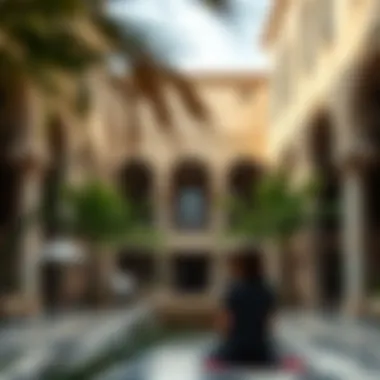
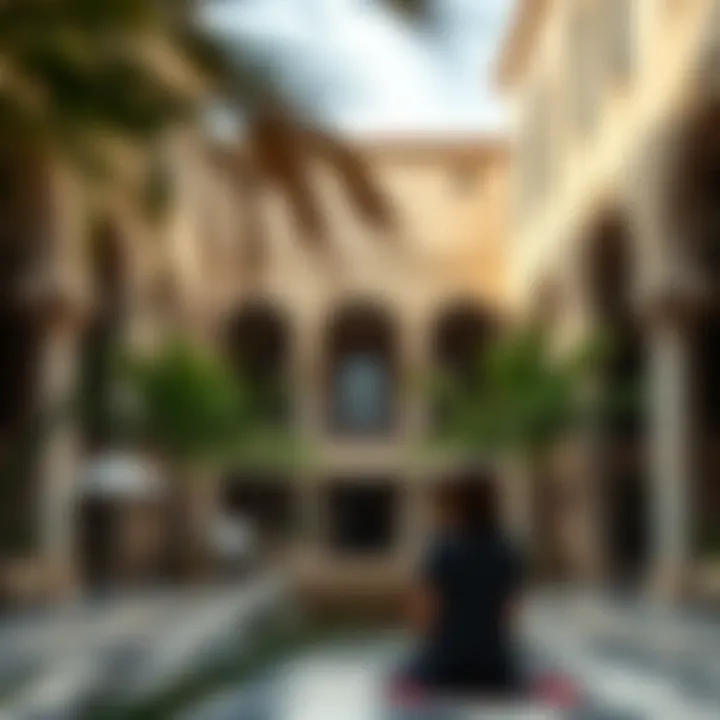
Impact of Expat Communities
Dubai is a melting pot of cultures, and this is particularly evident in its expat communities. Nearly 90% of the city’s population consists of expatriates, each bringing their unique rituals and traditions. This demographic landscape results in a vibrant mosaic of prayer practices. For instance, while most of the local population practices Islam, significant communities of Indians, Pakistanis, Filipinos, and Westerners have established their places of worship that accommodate their specific prayer practices.
Expat communities participate in cultural festivals, which often include joint prayers and celebrations, blending their unique customs with local traditions. The intersection of these practices fosters a unique form of intermingling that can only be experienced in Dubai. The result is a robust cultural dialogue that enriches their understanding of each other's faiths. Creativity can be seen, for example, in the ways different communities organize prayer times around shared events or communal gatherings, enhancing the spirit of togetherness and respect.
Interfaith Observances
In a city that attracts people from around the globe, interfaith observances are essential in promoting harmony and understanding. Dubai’s approach to interfaith dialogue is often highlighted in events organized by various governmental and non-governmental organizations. These gatherings encourage open discussions on faith, allowing participants to share their beliefs and practices in a respectful environment.
Such initiatives include commemorative events during major religious occasions like Ramadan or Christmas. During these observances, places of worship are often opened up to the public, inviting non-Muslims to learn about Islamic traditions, and vice versa. For instance, the month of Ramadan sees various interfaith iftar events, where individuals from different faiths break fast together, promoting unity.
These practices underscore the significance of respect and understanding in a multicultural society. They also create a foundation for building relationships among diverse populations, where prayer is not just an individual act of faith but a communal experience that brings people together. The city's approach to interfaith observances fosters a cosmopolitan atmosphere that resonates well with its residents and visitors alike.
"In understanding prayer practices within the context of cultural diversity, one glimpses the beauty of coexistence in Dubai—a city where the old and new blend seamlessly."
Exploring the influences of expat communities and interfaith observances reveals not just the variety of prayer traditions present in Dubai, but the city’s innovative spirit in managing this diversity. By acknowledging and embracing these differences, Dubai continues to thrive as a global hub, where prayers echo in harmony across cultures and faiths.
Prayer Etiquette for Visitors
Dubai is a city where tradition and modern life coexist harmoniously, and understanding prayer etiquette is vital for any visitor. The act of prayer is not just a personal devotion here—it reflects a collective appreciation of faith, community, and cultural values. By adhering to specific etiquettes, visitors not only show respect but also enhance their own experience in the city. Knowing what to expect and how to behave in religious spaces can lead to more meaningful encounters with the local culture.
What to Expect in Mosques
Visiting a mosque in Dubai is often an eye-opening experience for many. These places of worship are not solely for prayer; they are cultural landmarks that provide insight into Islamic practices. As you step inside, expect a serene atmosphere, often filled with the fragrance of incense and the gentle whispers of prayers.
- Guided Tours: Many mosques offer guided tours for visitors, which can be invaluable. Here, you can learn about Islamic architecture, the significance of various features, and understand the prayer rituals.
- Architectural Beauty: Marvel at the intricate designs and calligraphy that adorn the walls. Each mosque tells its own story through its architecture, honoring tradition while sometimes embracing modernity.
- Separation of Spaces: In larger mosques, there are often specific areas designated for men and women to pray. Ensure you are aware of these divisions.
In general, the mosque is a tranquil space and needs to be treated with utmost respect.
Dress Code and Behavior
The dress code in mosques reflects the cultural norms of Dubai, which is rooted in Islamic tradition. Adhering to this code shows sensitivity to local values and customs.
- Modest Clothing: Visitors should wear clothing that covers shoulders and knees. For women, it can be beneficial to carry a shawl or scarf to cover their head if needed, though this is not always mandatory.
- Footwear: It is customary to remove shoes before entering the prayer area. Most mosques will have designated areas for shoes.
- Avoid Distractions: Once inside the mosque, maintain a quiet demeanor. Always put your phone on silent; taking phone calls is generally considered disrespectful in such a sacred setting.
- Photography Rules: Picture taking is often restricted, especially during prayer times. When in doubt, ask for permission to respect the privacy of worshippers.
"Respect is the foundation upon which beautiful cultural exchanges are built."
When it comes to behavior, being considerate goes a long way. Keep conversations low and avoid loud laughter or disruptive activities. In some mosques, one may also encounter worshippers engaging in prayer. Be sure to give them space and remain unobtrusive.
Social Gatherings and Prayer
In Dubai, the intersection of social gatherings and prayer forms an integral part of the cultural fabric. Given the city’s vibrant demographics, every community contributes its unique customs and traditions. Social gatherings are not mere meetings; they are rites of togetherness, remembrance, and reflection, creating strong bonds among individuals while also intertwining faith and community.
These gatherings often see residents and expatriates come together in homes or public spaces for prayers, especially during significant Islamic occasions. The experience is not just spiritual; it fosters a sense of belonging, offers support networks, and showcases the diverse tapestry of religions and cultures coexisting in the city.
Community Events and Prayers
Community events surrounding prayer often serve as platforms for cultural exchange and understanding. From local iftars during Ramadan where Muslims break their fast together, to communal prayers at major mosques, these events draw in numerous participants from varied backgrounds.
- Inclusivity: Everyone, regardless of their religious beliefs, is often welcomed to partake in these occasions. For expatriates, this is a significant opportunity to engage with local customs and meet others, thereby cultivating a deeper appreciation for the Emirati culture.
- Festivals and Ceremonies: Events like Eid al-Fitr and Eid al-Adha are celebrated with grandeur, where joint prayers followed by festivities provide a window into the spiritual joy that permeates Dubai.
- Enhanced Relationships: Such gatherings provide an avenue for building friendships and fostering a collaborative spirit amongst different nationalities, which is a true reflection of Dubai’s multicultural ethos.
"In Dubai, the act of gathering for prayer is a celebration of unity, encapsulating the essence of community worship."
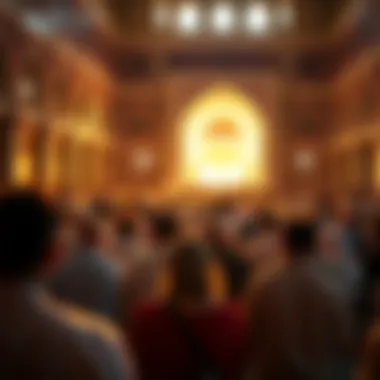

Prayer During Ramadan
The holy month of Ramadan holds a unique place in Dubai's social calendar, where the act of prayer becomes especially prominent. As the sun sets, the call to prayer echoes throughout the city, marking not only the end of the daily fast but also the communal gatherings that follow.
During Ramadan, special nightly prayers called Taraweeh are held in mosques, often attracting large congregations. The sense of collective spirituality fosters a renewed commitment among participants, drawing them closer to their faith while enjoying the company of fellow believers.
- Breaking Fast Together: Iftar meals often transform into communal feasts, with large groups gathering in mosques or community centers to share meals that signify both the end of the fasting day and the spirit of generosity that Ramadan embodies.
- Charity and Support: The holy month emphasizes charity and giving, drawing people together to help those less fortunate. Many community prayers include organized drives for food and donations, ensuring that the act of worship also resonates with compassion and empathy.
- Cultural Practices: Notably, Ramadan prayer practices incorporate elements of traditional Emirati hospitality, with gatherings often accompanied by Arabic coffee and sweets, enriching both the spiritual and social experience.
Technology and Prayer Accessibility
In the bustling metropolis of Dubai, technology plays a pivotal role in enhancing the accessibility of prayer for its diverse population. As the city continues to grow, the fusion of modern innovation with deeply rooted traditions becomes increasingly relevant. This section explores how technology serves as a bridge for both residents and visitors to practice their faith seamlessly, while also addressing the considerations surrounding this integration.
Apps for Prayer Times
The reliance on technology has led to the creation of various apps that help people keep track of prayer times. With the city’s unique geographical location and varying cultural backgrounds, these apps are specifically designed to cater to the needs of individuals across different sects. Popular applications such as Muslim Pro and Azan provide accurate prayer timings, which adjust based on your current location.
These apps often include additional features that enrich the user experience:
- Quranic verses and daily reminders to encourage spiritual engagement.
- Audio of the Adhan for those who appreciate its traditional context.
- Community features to connect with others during prayer times.
The convenience of having these apps on a mobile device allows users to receive notifications, ensuring they never miss a crucial prayer moment, even in the hustle of daily life. It's a simple yet powerful way to keep spiritual commitments at the forefront.
Online Religious Services
The shift towards online religious services has become increasingly significant, especially in the context of recent global events that have impacted traditional gatherings. In Dubai, many mosques have embraced technology by providing online services for the community, including virtual prayers, lectures, and educational sessions on Islam.
Platforms such as YouTube and Zoom have gained popularity for hosting live streams of Friday prayers and special religious events. This not only serves those who cannot attend in person—whether due to geographical distances or health reasons—but also fosters an inclusive community spirit.
Through these online services, practitioners are able to:
- Experience the sense of unity and collective worship, even from afar.
- Engage with knowledgeable speakers and scholars who might otherwise be inaccessible.
- Participate in interfaith dialogues that promote understanding and respect among diverse populations.
"Technology should not replace the tradition, but enhance it, creating new avenues for faith and community engagement."
As Dubai positions itself as a global hub, the continued evolution of technology in prayer practices remains a testament to how tradition can harmonize with innovation. By understanding these advancements, investors, expatriates, and new residents can navigate this vibrant community with greater insight and appreciation.
Challenges Faced by Prayer Practitioners
In Dubai, the interplay of tradition and modernity creates a unique landscape for believers engaging in prayer. However, navigating this vibrant city can present distinct challenges for those who wish to uphold their spiritual practices. Recognizing these challenges is essential for understanding how prayer fits into the fabric of life in Dubai.
Balancing Tradition with Modern Life
For many in Dubai, maintaining religious traditions while adapting to a fast-paced urban environment is no easy feat. Expatriates and locals often find themselves caught in a tug-of-war between the deep-rooted customs of their faith and the demands of contemporary living.
For instance, a businessman might need to leave a significant meeting for prayer, which can cause unease among colleagues who may not fully understand the cultural importance of this act. Such circumstances highlight the necessity of finding a middle ground; creating a schedule that accommodates both work commitments and religious obligations becomes key. Additionally, some may struggle with finding appropriate places to pray in places like shopping malls or office buildings, where private spaces aren't always readily available.
- Recognizing Personal Needs: It's crucial for practitioners to evaluate their needs while navigating through the demands of their professions. This means planning ahead so that they can make time for prayer without sacrificing their work performance.
- Fostering Understanding: It also opens the door for discussions around cultural appreciation in the workplace. Encouraging non-Muslim colleagues to understand the significance of prayer can build a more harmonious environment.
Accessibility Issues
Another pressing challenge revolves around accessibility to prayer spaces. Dubai's landscape is a mix of modern skyscrapers and traditional architecture, yet access to suitable facilities for prayer can sometimes be inadequate, especially for those living in high-density residential areas.
Moreover, while Dubai does have many mosques, they may not be strategically located for everyone, particularly for those residing in newer districts where construction often outpaces religious infrastructure. The challenge isn't just physical; there’s also a need for the city to offer signs in multiple languages to assist newcomers who may not be fluent in Arabic but still want to participate in prayer.
- Finding Spaces in Crowded Areas: In bustling districts, prayer spaces can fill up quickly. Individuals may find it challenging to squeeze in prayer during busy times of the day.
"Accessible prayer facilities, combined with cultural initiatives, can enhance the experience for both residents and visitors."
- Bridging Gaps Through Technology: Thankfully, advancements in technology have provided some solutions. Mobile applications can inform users of nearby prayer places, alert them about prayer times, and even guide them through the steps of prayer for those still learning.
Understanding these challenges offers valuable insight into how practitioners navigate their religious commitments in a landscape that is constantly evolving. This balance of tradition and modernity is essential to grasping the broader context of prayer within Dubai's diverse environment.



